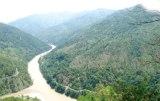Ensuing Teesta River Water Sharing Treaty?
Will India share the waters of the river Teesta with Bangladesh?
 The visit of Indian Premier Dr. Manmohan Singh to Bangladesh had shaded over the cloud of the Teesta River water sharing treaty. When Dr. Manmohan landed in Bangladesh, Bangladesh Prime Minister Sheikh Hasina received him with a hearty and warm smile but the situation was still clouded. After the meeting between Dr. Manmohan and Hasina a welcomed ray of sunshine parted the clouds. The concerned people of Bangladesh really saw the ray of the sun after Dr. Manmohan Singh’s speech at the senate of Dhaka University.
The concerned people of Bangladesh could understand the mindset of India. However, the common people of Bangladesh could see the brighter days ahead after the meeting between Dr. Manmohan Singh and Abul Mal Abdul Muhith, the Finance Minister of Bangladesh. After that meeting, the Finance Minister said that the Teesta River water sharing treaty will be inked within three months.
The visit of Indian Premier Dr. Manmohan Singh to Bangladesh had shaded over the cloud of the Teesta River water sharing treaty. When Dr. Manmohan landed in Bangladesh, Bangladesh Prime Minister Sheikh Hasina received him with a hearty and warm smile but the situation was still clouded. After the meeting between Dr. Manmohan and Hasina a welcomed ray of sunshine parted the clouds. The concerned people of Bangladesh really saw the ray of the sun after Dr. Manmohan Singh’s speech at the senate of Dhaka University.
The concerned people of Bangladesh could understand the mindset of India. However, the common people of Bangladesh could see the brighter days ahead after the meeting between Dr. Manmohan Singh and Abul Mal Abdul Muhith, the Finance Minister of Bangladesh. After that meeting, the Finance Minister said that the Teesta River water sharing treaty will be inked within three months.
Mr. Muhith is not only the Finance Minister of Bangladesh but is also the senior most politician and minister in Hasina’s cabinet. Therefore, his comment carries weight but the basis on which this comment was made is a point of question. Two days after his comment, I talked with him and asked him the reason for his statement that the Teesta River water sharing treaty will be signed before next winter. He replied by saying that the India’s mindset has been changed. “We have got back trust. It is a remarkable transformation of mindset of the two countries. Yes, it is true that, the two countries bureaucracy have a problem. They show more patriotism than their people and the politician. They are also showing that if the politicians are able to take a decision or change their mindset then bureaucracy is bound to walk in that way,” he said. “It is therefore clear that the next joint river commission of India and Bangladesh will be able to come to a solution on the Teesta River water sharing treaty. Now that the Indian Government and the Prime Minister of India have decided on the matter, they will build up a good relation with Bangladesh and they are going to establish regional cooperation. India is going to build up regional relations with Nepal, Bhutan and Bangladesh. This is India’s new attitude. They are now a big economy and they are going to get bigger. So they have changed their attitude with their neighbors. If India opens its market to all the SAARC countries, then only 15 percent of their market can be taken by Bangladesh, Nepal, Sri Lanka, Bhutan, Pakistan and the Maldives. So now it is not creating any problem but it will help to transform them from regional powers to world economy powers. India is moving along these lines so it will not wait for a Teesta River water sharing treaty to build up a good relation with Bangladesh. I think that, if Sonia Gandhi was present, Dr. Singh could tackle the Chief Minister of West Bengal. However, after Dr. Singh’s speech at the senate of Dhaka University, it is clear that, Dr. Manmohan Singh and his India have made the decision to sign the Teesta River sharing treaty and two countries already found the way. We know that, there are two embankments on the Teesta in Indian soil. The first embankment is not harmful to Bangladesh. So, two countries more or less have come to a point where they will take a fifty – fifty share of the water of that river from the flow of that point. West Bengal Chief Minister Mamata Bannerjee is saying that, she wants 75 % of the total water. This is her political stance and is not reality. So, I have come to the understanding that in the next Joint River Commission meeting, the two countries will be able to come to a rational point. Besides that, after the visit of Dr. Manmohan Singh, the next Joint River Commission meeting will be before winter. So it will take more than two months. That is why we can say that, the Teesta River sharing water treaty will be signed within three months. We can also see that New Delhi is in the process of inking a peace treaty with the United Liberation Front of Assam (Arabinda Rajkhowa faction) which is helping the Government re-establish peace in the Northeastern region of India. It would not have been possible to get help in this matter from Bangladesh if madam Hasina had not extended her whole hearted support to the cause. Will the development not encourage both New Delhi and Dhaka for a pragmatic Teesta treaty very soon?” he says.
Swadesh Roy
Swadesh Roy is a Dhaka based senior journalist and serves as Executive Editor of Dainik Janakantha, a leading Bengali newspaper of Bangladesh.


